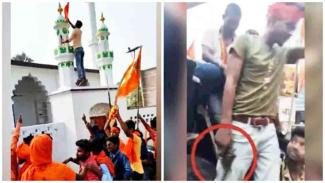A report by Citizens & Lawyers Initiative ‘Routes of Wrath: Weaponising Religious Processions - Communal Violence During Ram Navami and Hanuman Jayanti’ on the violence that occurred in nine states during Ram Navami and Hanuman Jayanti processions in year 2022 points to “distinct and eerie patterns” that was seen in all the states. Same pattern “with regard to the genesis of violent processions as well as the set of conditions that are cultivating communal tensions” is repeated this year again. The common methods and tools for perpetrating violence are:
- larger-than-usual gatherings of saffron-clad men drawing swords, waving trishuls and even firearms,
- taking deliberately mapped paths that crossed major mosques and Muslim-dominated neighbourhoods,
- raising provocative slogans about the coming of a Hindu Rashtra,
- use of high-decibel mega-speakers to blast hate-filled anti-Muslim music
- targeted attack on Muslim shops, handcarts, businesses, livelihoods, and even homes.
- states that saw the most violence are also those where Hindutva groups and extremists enjoy the highest levels of political patronage.
- propaganda to lend credibility to the notion of “Hindu khatre mein hai” (Hindus are in danger).
- mainstream media, particularly television channels and right wing politicians blaming Muslim communities that threw stones at the processions without provocation.
- TV channels manufacturing fear amongst the Hindu majority, against minority communities.
The reports suggests that the choice of taking out processions on ‘Ram Navami’ and ‘Hanuman Jayanti’ may not be coincidental because both days happened to fall in the month of Ramzan. “The processions concertedly targeted places of worship by gathering in front of Mosques and chanting anti-Muslim slogans, either at the same time as namaz was being offered, or at the breaking of the fast after sunset, thereby ensuring that the confrontation would coincide with the largest possible number of Muslim people being present and vulnerable.”
The most worrying aspect during such violence was the administrative response that seemingly fits well into the designs of Hindutva groups, mainly the use of bulldozers to selectively and collectively punish the minority community after many such incidents, inculcating sense of fear and exclusion. The report pointed out that “Coordination between Hindutva outfits, and the police and district administration, means combining an extreme ideological entity with the civil service... the relationship between them has become institutionalised in many parts, sustaining a violently undemocratic model of governance that is anathema to the rule of law”.
Justice Rohinton F. Nariman, Former Judge of Supreme Court of India rightly warned in his foreword to this report of a “constant downward movement insofar as democratic values are concerned in India”. He reminds us of Article 51A of the Constitution of India that describes the duty of every citizen to “abide by the Constitution and respect its ideals and institutions”, “to promote harmony and the spirit of common brotherhood amongst all the people of India transcending religious, linguistic and regional or sectional diversities; to renounce practices derogatory to the dignity of women, “to value and preserve the rich heritage of our composite culture, and “to safeguard public property and to abjure violence”.
Such attacks on India’s religious diversity, syncretic culture, harmony and common brotherhood undermines the Constitution and weakens the social fabric.











